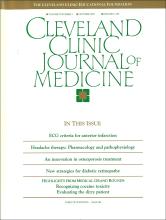ABSTRACT
Chronic renal disease is a progressive process. Implicated factors include abnormalities of the clotting cascade, altered prostaglandin metabolism, increased dietary protein intake, and abnormalities of lipoprotein metabolism. Several animal models have associated increased serum concentrations of cholesterol and triglycerides with progressive decline in renal function. The mechanism(s) of lipid-associated renal injury are unknown but may relate to lipid uptake by glomerular mesangial cells, hyperviscosity secondary to the hyperlipidemia, and a direct effect of the lipids on the glomerular basement membrane. Patients with chronic renal disease have well recognized increases in serum lipid concentrations. Whether lowering these concentrations will delay or prevent progressive renal failure or renal histologic abnormalities is unknown, but studies are underway to evaluate the effect of lipid-lowering agents in patients at risk for chronic progressive renal disease.
- Copyright © 1990 The Cleveland Clinic Foundation. All Rights Reserved.






